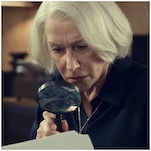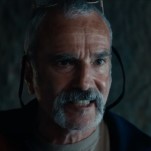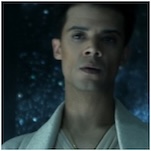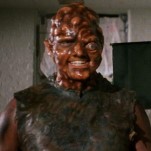American Gods: Sorry, We Don’t Believe “The Beguiling Man” for One Second
(Episode 2.02)
Photo: Starz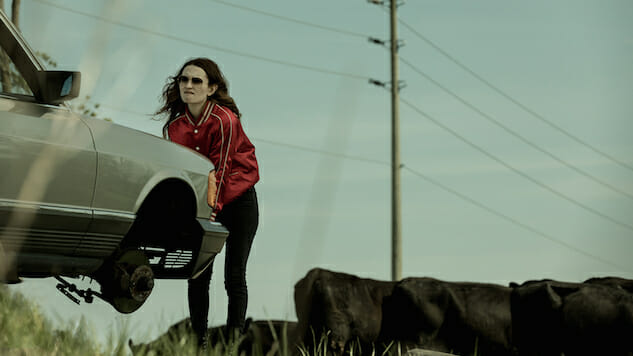
When Laura (Emily Browning) storms over to Wednesday (Ian McShane) in “The Beguiling Man,” demanding a plan to rescue Shadow (Ricky Whittle) after his kidnapping at the end of the season premiere, Wednesday asks Laura to have faith in her man.
But after driving with Mad Sweeney (Pablo Schreiber) to go after Shadow and literally running into a dead end, Laura gives up. She lays down in the field, creating a pretty picture of a beautiful dead woman in a graveyard (which the characters make sure to talk about, in case you miss the visual reference), and she needs Mad Sweeney to give her a pep talk to keep going.
But I don’t believe for one second that Laura would give up looking for Shadow. And that’s the main issue with this episode of American Gods—it doesn’t make me believe.
I don’t believe that Laura would give up so easily when the storytelling that came before shows she moves forward no matter the cost. She had a perfect plan to rob a casino and didn’t back down from believing in its perfection, even after her husband’s arrest and all that followed. She’s consistently used her newfound undead strength to force her way through any obstacle, so the end of a road doesn’t seem like it should be enough to stop her.
I also don’t totally believe in Shadow’s relationship with his mom (Olunike Adeliyi). While it’s nice that American Gods is using flashbacks again, where so much of its lofty storytelling took place in Season One, these in particular weren’t effective. Young Shadow (Gabriel Darku) and his mother seem too sweet and too perfect, their interactions too clichéd. His mother’s only flaw is that she won’t reveal his father, and young Shadow’s only flaw is that he gets into a fight while trying to help someone. Both acts are meant to protect someone else, which only reinforces the characters’ goodness. American Gods generally exposes the things that aren’t what they seem, so when there’s only one layer of storytelling in Shadow’s flashbacks—and when the characters in that story are one-dimensional—it doesn’t feel real. Instead, it feels full of plot points meant to trigger tears. A lot of “The Beguiling Man” is exposition heavy, with characters talking about what they need to do and why they need to do it. The flashbacks are one area where an exposition would have been fine: They try to show viewers Shadow’s background instead of telling about it, but a few sentences from Shadow describing how he ended up alone in the U.S. would have been preferable to scenes that beg for emotion without putting in the time to make viewers actually feel that emotion.














